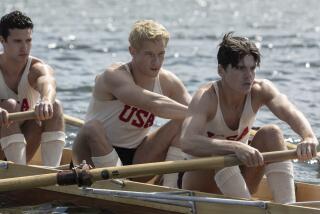For Modern Magellan, Rowboat Is Way to Go
- Share via
Tough as it was, Mick Bird and I arrived at an understanding the other day.
If he holds off writing a newspaper column for a while, I’ll refrain from rowing around the world alone.
Call me a softy, but I don’t want to steal Bird’s thunder.
Let the poor guy have his amazing anecdotes: The supertankers bearing down on his rowboat, the 40-foot waves whirling him around like a bay leaf in a food processor, the savage reefs that can shred steel hulls, the terrifying blackness of night a thousand miles from a nameless island that’s a thousand miles from the middle of nowhere.
And let Bird, too, be the one to experience the moments of rapture: The special-effects sunsets, the humpback whales dancing circles around him just 50 yards away, the knowledge that his muscle has mastered an ocean, the dizzying, starry solitude of the boat and the night and the sea.
He can have it all--and he deserves it.
Four years ago, Bird--country songwriter, musician, parachutist, athlete, spiritual adventurer--set out from Channel Islands Harbor to circumnavigate the globe by rowboat.
Scuttled by bad currents, the voyage lasted just four days.
A little later, he shoved off from Fort Bragg in Northern California. With breaks for boat repair, family time and stateside fund-raising, he has been tied to the oar for a total of almost nine months since then, pulling his way across the Pacific and into the Indian Ocean. If he goes all the way, he’ll be the first to row the globe.
Why is Bird, at 44, spending month after grueling month alone in a 28-foot-long, 6-foot-wide vessel, thousands of miles from his wife and twin 4-year-old girls at their home in Malibu? Why is he subjecting himself to such immense risk, loneliness and tedium as he crawls along the ocean’s surface, stroking 10 or 12 hours a day--one stroke, two strokes, and, now, nearly 3 million strokes?
“Because,” he explained, “it feels so good when you stop.”
Last February, I ran into Bird at a fund-raising lunch organized by Oxnard rancher Jack Broome. At the time, he had made it all the way to a port in northern Australia.
“Rowing around the world really isn’t all that dangerous,” he insisted.
Last Friday, at another lunch organized by Broome, he offered the same upbeat assessment to the same crowd of enthralled old-timers, sailors who had seen the sun pass over the yardarm more than once.
Of course, he did express a bit of concern about the pirates--the disemboweling, vessel-burning, equipment-thieving boatmen plying the waters off Java.
“When I see other boats now, I don’t even try to raise them on the radio,” he said. “You might say it’s been kind of a stealth row so far across the Indian Ocean.”
And there was that misunderstanding with the Indonesian immigration officials who threatened to place Bird in a Javanese holding cell--a place that sounds chillingly eternal.
Bird had to put in at Java when his water-desalinization system broke down. Unfortunately, he paddled into a harbor that wasn’t a customary port of entry.
“The officials kind of freaked out,” he said. “They didn’t know what to do; there wasn’t a little square on their documents that said ‘rowboat.’ ”
After intervention by U.S. diplomats, Bird was allowed to stay briefly in Java--but only with the watchful presence of a security agent wherever he went.
“I once yelled, ‘Hey! There’s Batman!’ ” and hid behind a door,” Bird said. “He thought it was pretty funny.”
For the most part, though, Bird’s human contacts were limited. Using a satellite phone, he talks to his family every day and e-mails photos back home and to his Web site (https://www.naau.com). On Thanksgiving, he sent his kids a photo of a gelatinous lump of Spam with two cardboard “drumsticks” attached with peanut butter.
“Think that looks bad?’ he asked the crowd. “On Day 63 in a rowboat, you’d fight me for it.”
On his trip’s most recent leg, Bird lost 45 pounds and a bit of swagger.
He knows now that he can’t circumnavigate the globe in a literal sense. After he leaves Java, he’ll head for southeast Africa, 4,000 miles away. At that point, he’ll be stuck; currents make rowing through the Suez Canal impossible, and the 70-foot waves off the Cape of Good Hope would be virtual suicide. He said he probably would have his boat airlifted to Capetown and proceed across the Atlantic.
“If that’s how it is, I’ll be fine with that,” he said. “I’ll be fine with being the guy who almost rowed around the world, the guy with an asterisk in the record books.”
If his journey has taught him anything, it’s detachment.
“The more I let go of the idea of having to do this, the more power I have to go on and do it,” he said.
Besides, he’s now addicted to audio books, listening to Joseph Campbell’s theories on mythology or the convoluted plots of Tom Clancy as he dips his oars in the water yet again.
“I’ve got to keep going,” he said. “I’ve got to find out how they end.”
*
Steve Chawkins can be reached at steve.chawkins@latimes.com or at 653-7561.
More to Read
Sign up for The Wild
We’ll help you find the best places to hike, bike and run, as well as the perfect silent spots for meditation and yoga.
You may occasionally receive promotional content from the Los Angeles Times.







